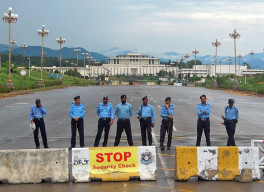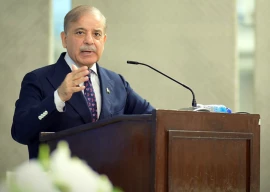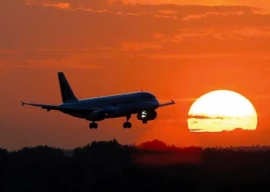Pakistan’s chequered history is a necessary backdrop to a discussion of how it became a lopsided national security state. Perkovich walks his readers through the 1950s, the India-Pakistan war of 1965, the Bangladesh conflict, the quest for nuclear weapons and Pakistan’s role in defeating the Soviet Union in Afghanistan. He gets his narrative right except when he relies too heavily on the opinions of some of his Pakistani sources. The quote from Hussain Haqqani, about the civil-military complex adapting the ideology of Pakistan to the demonisation of India’s Brahmin Hinduism is only a half-truth; the other half is to be found in the fact that in the early, post-independence years, Indian leaders including Nehru, expected Pakistan to collapse and exerted pressure from the international border; Kashmir and Afghanistan to accelerate this process. The observation made by Pervez Hoodbhoy and Zia Mian about the security establishment exploiting the nostalgia for a time when Muslims ruled India, ignores the fact that the central narrative culminating in the creation of a separate state was not revanchist but rooted in deep-seated secular anxieties of Muslims about the inevitability of the majoritarian principle in a modern state. Again, a major engine of the militarisation of the Pakistani state was the role that the US crafted for it in the Baghdad Pact, the ludicrous SEATO and in the subsequent ‘frontline state’, first against Moscow and then against violent jihadis, the legacy of that crusade. Perkovich describes the empowerment of Pakistan’s “grossly oversized and hyperactive military and intelligence services” as “the unintended but undesirable effect” of the American posture. Unfortunately, most of us recall it as very much an intended consequence.
The most compelling part of the study is the portion addressing the question of what the US and Pakistan should do now. The recommended template is that Washington should “stop enabling the Pakistani security establishment’s dysfunctional dominance of state” and pursue democratisation as “the only constructive alternative”. The one caveat that one has to enter here is that, unfortunately, Pakistan’s political class is no less addicted than the military to the dole-outs from Washington. The relationship is transactional as much because of its incessant demands for this largesse as Washington’s readiness to provide it on conditions that often hurt the interests of Pakistan’s people. The unprecedented paralysis of Pakistan’s political elite and bureaucracy is partly due to exaggerated fears of American displeasure kept at a very high level by visiting American dignitaries and by micro-management by American officials — diplomatic and non-diplomatic — posted to Pakistan. A rough and ready example of it is Islamabad’s prolonged vacillation about the desperately needed Iran-Pakistan gas pipeline.
Perkovich’s emphasis on redesigning American assistance and on new measures such as opening America to enhanced Pakistani imports is a qualitative departure from the standard American analysis. So is his advice that retrenchment of American involvement with the military should be accompanied by an effort not to over-indulge India and to reassure Pakistan that India-US collaboration will not threaten (its) security “ and also that India would not exploit its ongoing role in Afghanistan to challenge Pakistan’s internal stability, including in Balochistan”. Limitations of space do not permit a reference to many other preeminently sensible ideas in the essay. Suffice it to note, it offers a basis for a lighter but durable engagement between Pakistan and the US.
Published in The Express Tribune, September 19th, 2011.
COMMENTS (22)
Comments are moderated and generally will be posted if they are on-topic and not abusive.
For more information, please see our Comments FAQ

1731914690-0/trump-(26)1731914690-0-165x106.webp)








1731929357-0/Express-Tribune-(6)1731929357-0-270x192.webp)






There should be lot more focus on Pak-Ind relations rather than Pak-US or US-Ind. Peace in South Asia has been missing since the partition and about time that a Germany/France style compromise is rached. Enough of non-sense.
One of the finest articles about Pak US relations, I have come across in the recent days>
with due respect to all above comments.in my humble opinion theses tactical movement is part of big strategy. U.S govt has realize that American military’s false claims of victory have become pyrrhic so far. to get a soft exit from Afghanistan this pressure will serve them on diplomatic ground.as a famous quote “if the campaign is protracted,the resource of the state will not be equal to the strain”. how long U.S tax payer will pay for war?. with due respect to all above comments.in my humble opinion theses tactical movement is part of big strategy. U.S govt has realize that American military’s false claims of victory have become pyrrhic so far. to get a soft exit from Afghanistan this pressure will serve them on diplomatic ground.as a famous quote “if the campaign is protracted,the resource of the state will not be equal to the strain”. how long U.S tax payer will pay for war?.
dear Dr. death smiles at every man, what one can do is smile back. if the nation is on the verge we would rather die with honour. the history what we make,and what we are.history books is face saving for many who never performed. history in making
@Sarosh...your presumptions on China are wrong footed. Just look at your own political analysts, who have understood that it cant and wont work. If China was serious to take up your issues on itself, it would have helped your flood victims, what did it give you in relief?? A paltry sum of forty million...and when you begged for 600 million for restructuring your economy, it flately refused that sum to you and did not grant a single penny.
So, stop living in daydreams. Get real. Even donor agencies of the world have refused to help your victims despite UN appeal because they know your govt will eat up the money and wont invest where it is supposed to be.
And no country needs to thrust any war on Pakistan. Do what you are doing and you are doomed anyways. If you dont follow what US tells you to do in N Waziristan, sanctions come,which means you wont be able to export to US, let me remind you, 60% of your cotton export is to US...now sit back and think...
@ Ghaznavi - LOL you are another delusional Pakistani brother. Please stop kidding yourself. Our history textbooks are full of lies. India is far more honest about their past than we are.
I agree Pakistan economy is anemic.but Pakistan is the only country which can provide safe passage to allies forces which is due in 2014. any sort misadventurism by U.S would provoke neighboring friends to act upon. see may 2011 China statement is any war wage against Pakistan.
@Ghaznavi: Regarding 1965 Indo-Pak war,I was just quoting from George Perkovich’ s article “Stop enabling Pakistan’s dangerous dysfunction”, which author is discussing in this article. In this article page 3&4 "The first crisis in U.S.-Pakistani relations came in 1965, after “irregular forces” nurtured by Pakistan infiltrated the Indian-controlled areas of Kashmir seeking to exploit Muslim unrest there. India retaliated and widened the war along the border. .........Ayub Khan later admitted that the war had been triggered by Pakistan’s incursions". The same story is told in war diary of Major (Retd) A.H Amin of Pakistan Army in detailed in his book "The Pakistan Army till 1965". and You can see on You Tube Former Pak Air Chief Asghar Khan(http://www.youtube.com/watch?v=7rGVpiWH-&feature=related) and prominent Pakistan Journalist Najam Sethi (http://www.youtube.com/watch?v=exAlTqrfRa4&feature=related). So get your fact corrected by listening to these prominent Pakistanis.
Obviously we and the hindians are taught different history in the classrooms. Yet you won't see us sermonizing them with our version of history - it is not worth it. We wont accept their narrative and they wont ours and yet you have to marvel at their perseverance. I accept the narrative presented by the author because, as I know this is to be closer to the truth. India is a revanchist state and its actions speak louder than words.
@ Prakash
India attacked Pakistan by violating the international borders at Lahore. You better get your facts right. What version of distorted history is taught to you in your schools? Even with a surprise attack, your army could not take lahore from. This says something about your corrupt army, good for only killing unarmed Kashmiri teenagers and dishonoring Kashmiri women....
Over indulge India? What does that mean?
US and India ties will define the 21st century and you are telling the Americans to tone it down for the sake of a Country whose economy is not even considered worthy of being included in the G20? Or, whose political and socio-economic structure is considered weak enough to be rated the 12th most failed state?
Tell me why should American listen, in this scenario?
The statement "indulgence of India" is not only patronizing but really an affirmation that Pakistan premised and formulated policies based on hatred of the neighbor rather than the welfare of its people. To perceive that India's rise is due to the indulgence of the International community and not the hard work of its people or its democratic secular polity, may be music to the ears of brainwashed citizens but is a travesty of the Truth. Repeating lies cannot create the Truth. " Deep-seated secular anxieties of Muslims" sounds fantastic but those who valued secularism preferred to stay back in India, practice it, prosper and contribute to its rise. The promise of pipe dreams could not entice them to migrate and they are thankful to their fathers and grandfathers for their foresight. Brother, the contribution of Indian Muslims to its rise should not be rubbished with bigoted views, even a golden invitation will not entice 1% of Muslims to renounce their Indian citizenship. The difference between India and Pakistan is that India is a people centric country where the population feels empowered to make their own destiny and has not delegated or mortgaged its future to its Military or Security Establishment. As an Indian I feel no sympathy for Pakistani rulers but feel strongly for my brothers and sisters who are being traumatized and whose blood is being spilt everyday. Allah O Akbar !
It has become a fade among the educated liberals also to keep putting blame on India and get excused for their incapable leadership and lethargy. Selective quoting of articles, lies and deciets have become order of the day in Pakistan. If one reads Indian newspapers, all the blame heaped on Pakistan are about terrorism and the world have been given enough evidence about them. Otherwise nobody cares about Pakistan (except MMS and Kuldip Nayar occassionally) If one reads Pakistan newspapers, India is blamed right from a road accident, to the earthquake, to the melting of glaciers, to the incursion in Balochistan, to the sectarian violence and so on on a daily basis. Pity the poor pakistanis. Nobody in the world have been taken for a jolly ride by their own rulers or the army or both
@Tanvir Ahmad Khan
Sir,
One often hears about the role and influence of India in Afghanistan.Let us say Pakistan has some influence and let us also say India has some influence. Now let us try and see what has this influence translated into.
India suffered a hijacking to Afghanistan and two attacks on its embassy in Kabul.
Nothing like this happened to Pakistan. On the contrary it transpires that not only was OBL in Pakistan but reports about Haqqani Network and Quetta Shura were also correct.
Water and Petrol both are liquid, but you may use Petrol to douse a fire at your own extreme peril.
You found a kindered soul in Perkovich whose recommendations fit your establishment narrative. Can we stop our obsession with India and start constructively getting passionate about just Pakistan - the one that belongs to the people? Most of your article is a rehash of "US and Pakistan can be friends as long as USA does not get too close to India". We have the same approach with Afghanistan - "if I can't have you, no one else will either." This is an immature, irresponsible and unconfident approach to national affairs.
With all the connections you have, please expose India's wicked paws in Balochistan and Afghanistan. Put this evidence out in the public domain. Let us give them as good as they did over Mumbai (and many others incidents).
George Perkovich also talks about the Pakistan and its establishment role in creating Bangladesh, insurrection in Kashmir. George Perkovich also mentioned General Ayub Khan admission that 1965 Indo-Pak war was started by Pakistan.It is interesting to note that every year Defense Day is observed in Pakistan on national scale accusing India for attacking Pakistan in 1965.
@ Author
... deep-seated secular anxieties of Muslims about the inevitability of the majoritarian principle in a modern state
With all due respect, you are wrong. There are numerous countries where your so-called "inevitability of the majoritarian principle" has no effect on the rights of minorities. So, aspiring for a society where the majority does not oppress the minority is not a pipe-dream. It is actually a proven concept.
But to trust and believe that such a just society is possible, takes vision and a belief in shared human values.
A better course of action for Mr. Jinnah and the Muslim League would have been to work something out within the existing framework. But Mr. Jinnah chose to take his ball and bat and go home. It is also a fact that Mr. Nehru and other Congress leaders did not make things any easier.
It would be better if your rewrote your sentence as "... deep-seated anxieties of elites about sharing power....". Muslims (or Hindus) had nothing to do with any of this. They just paid the price later on.
This piece is a brilliant analysis as well as a great commentary on the Pakistan-US relationship.
The author continues to live in a delusional land. We keep questioning India's intentions in Afghanistan. We have no shred of evidence to show any Indian involvement in Baluchistan. If we do, why haven't we shared it with the UN and NATO? We have no shred of evidence showing that India is doing anything more than defending its massive investment in Afghani infrastructure. India has just as many consulates as we do.
We can continually lie to ourselves and make excuses for having the Armed Forces suck the life out of our country by taking all of our budget or we can wake up to the truth, shut down the jihadis, and set ourselves on a course for true democracy.
Wake up Pakistan.
The powers that have ruled Pakistan for last 60 years have ruined it for the 95 plus % of Pakistanis. The arangement has been godd for the 2-3% Pakistanis who rule Pakistan or are wealthy landlords inheriting wealth and have enjoyed the fruits of its establishment and prospered. Whats the basis for arguing or expecting that the powers who have benefitted most by the current arrangement will change it to benefit the 90% plus disposessed ? If Pakistan was a democracy and the establishment answerable to elected representatives , not just representing the wealthy class, than things would have been different.